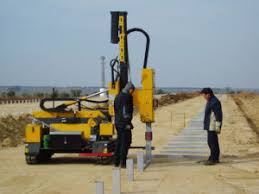Pile driving is a critical part of many construction projects. Whether building bridges, foundations, or large structures, a pile driver ensures that piles are installed securely into the ground. For many contractors and farmers, buying a pile driver is expensive and not practical for one-time or occasional use. That is why many people choose to rent a pile driver.
Renting a pile driver is cost-effective and convenient. However, it is important to understand the equipment and assess your project needs before making a rental decision. In this article, we will guide you through the key considerations to ensure that renting a pile driver is safe, efficient, and suitable for your project.
Why Renting a Pile Driver Can Be a Smart Choice
Renting a pile driver has several advantages:
- Cost Savings: Purchasing a pile driver is a significant investment. Renting allows you to access professional-grade equipment at a fraction of the cost.
- Flexibility: Rental options allow you to choose the size and type of pile driver suitable for your project.
- Access to Modern Equipment: Rental companies often provide the latest models with advanced features, improving efficiency and safety.
- Maintenance-Free: Rental equipment is typically well-maintained by the provider, reducing your responsibility for repairs.
These benefits make renting a pile driver an appealing option for construction contractors, farmers, and civil engineers.
Key Factors to Consider Before You Rent a Pile Driver
Choosing the right pile driver is crucial to completing your project efficiently. Here are the main factors to consider before you rent a pile driver.
1. Type of Project
The type of construction project determines the size, power, and type of pile driver needed. Consider:
- Foundation Work: Requires precision and steady driving for concrete or steel piles.
- Bridge or Highway Construction: May need a heavy-duty pile driver capable of handling large piles.
- Marine or Dock Projects: Equipment must be suitable for water-adjacent areas and wet soil conditions.
Understanding your project type ensures that the rented pile driver meets your needs.
2. Type of Piles
Piles come in various materials and sizes, including steel, concrete, and timber. When you rent a pile driver, it is important to select equipment compatible with the pile type you are using.
- Steel Piles: Often require high-impact or vibratory pile drivers.
- Concrete Piles: Require careful handling and sometimes lower-impact drivers to avoid damage.
- Timber Piles: Smaller pile drivers or vibratory types may be suitable.
Matching the pile driver to the pile type prevents damage and ensures efficient installation.
3. Size and Weight of the Pile Driver
Pile drivers vary in size and weight. The crane or lifting equipment used to operate the pile driver must support its weight. When planning to rent a pile driver, confirm:
- The maximum weight your crane can handle.
- The reach and height required for the piles.
- Any transportation limitations to and from the construction site.
Selecting the correct size ensures safety and avoids equipment overload.
4. Soil Conditions
Soil type plays a key role in pile driving. Different soils require different vibration, impact, or energy levels. When you rent a pile driver, consider:
- Soft Soil: Vibratory pile drivers are often sufficient and faster.
- Dense Clay or Rocky Soil: May require heavy impact pile drivers for proper penetration.
- Wet or Sandy Soil: Ensure the equipment can handle unstable or shifting ground.
Understanding the soil type helps you select a pile driver that will work efficiently and reduce the risk of delays.
5. Rental Duration and Availability
Before renting, determine how long you will need the pile driver. Rental companies may charge daily, weekly, or monthly rates. Consider:
- How many piles need to be installed.
- Project deadlines and scheduling.
- Backup plans in case of unexpected delays.
Planning the rental period avoids unnecessary costs and ensures equipment availability when needed.
6. Operator Requirements
Operating a pile driver requires skill and experience. When you rent a pile driver, ask:
- Does the rental company provide trained operators?
- Are your staff trained and certified to operate the equipment safely?
- Are there any specific safety protocols for the equipment?
Ensuring that the operator is skilled reduces the risk of accidents and improves project efficiency.
7. Safety Considerations
Pile driving can be dangerous if not handled correctly. Before you rent a pile driver, check for safety features and protocols:
- Protective guards and safety devices.
- Emergency stop functions.
- Instructions for safe lifting, positioning, and operation.
- Compliance with local safety regulations.
Safety is critical to prevent injuries and protect both workers and equipment.
8. Maintenance and Support
Even though rental equipment is usually maintained by the provider, confirm:
- The equipment’s maintenance history.
- Availability of technical support or emergency service during the rental period.
- Replacement options if the pile driver malfunctions.
Proper support ensures that your project continues without delays.
9. Cost and Budget
Finally, the cost of renting a pile driver is a major factor. When planning to rent a pile driver, consider:
- Daily, weekly, or monthly rental rates.
- Transportation and setup costs.
- Operator fees if provided by the rental company.
Compare multiple rental providers to find the most cost-effective option that meets your project requirements.
Benefits of Renting vs. Buying
Renting a pile driver has clear advantages:
- Lower Initial Investment: Avoids the high cost of purchasing a pile driver.
- Access to Advanced Equipment: Modern models improve efficiency and safety.
- Flexibility: Rent equipment based on project size and type.
- No Long-Term Maintenance: Rental companies manage servicing and repairs.
For occasional or short-term projects, renting is often the smarter choice compared to buying.
Conclusion
Pile drivers are essential for many construction and foundation projects. For contractors, engineers, and farmers who need efficient and safe pile installation, the option to rent a pile driver provides flexibility, affordability, and access to modern equipment.
